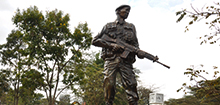 Wildlife crime is one of the main challenges in wildlife conservation. Kenya's invaluable wildlife resources are under threat due to wildlife crime which has been on the increase in the recent past. With a significant population of wildlife living outside the protected areas on a seasonal or permanent basis, the scope of the Security Division’s mandate is much wider than the protected areas. The Security Division is the functional arm of KWS which ensures that wildlife resources and their habitats are secure.
Wildlife crime is one of the main challenges in wildlife conservation. Kenya's invaluable wildlife resources are under threat due to wildlife crime which has been on the increase in the recent past. With a significant population of wildlife living outside the protected areas on a seasonal or permanent basis, the scope of the Security Division’s mandate is much wider than the protected areas. The Security Division is the functional arm of KWS which ensures that wildlife resources and their habitats are secure.
 To protect wildlife and its habitat, enhance security in protected areas and safeguard KWS assets and to enforce the Wildlife Conservation and Management Act 2013.The overall goal and primary mandate of the Division is to strengthen law enforcement, protect wildlife and its habitat, enhance tourist security in protected areas and safeguard KWS assets. The division has greatly reduced the level of poaching, improved visitor security and has strengthened Parks and Reserves management.
To protect wildlife and its habitat, enhance security in protected areas and safeguard KWS assets and to enforce the Wildlife Conservation and Management Act 2013.The overall goal and primary mandate of the Division is to strengthen law enforcement, protect wildlife and its habitat, enhance tourist security in protected areas and safeguard KWS assets. The division has greatly reduced the level of poaching, improved visitor security and has strengthened Parks and Reserves management.
The Division has four departments that deal with the different aspects of wildlife security. Wildlife Protection Department is mainly charged with provision of security to wildlife and its habitat, provision of security to visitors in protected areas and other tourist circuits under KWS jurisdiction, protection of KWS assets and property and combating poaching through high profile foot, vehicle and aerial patrols. The department also maintains a canine unit, to compliment the work of its professionally trained ranger workforce. Other specialized units in the department include the SEAL unit which is a unit specialized in rapidly responding to emerging threats.
 Intelligence Department is charged with the responsibility of collecting, collating, and analyzing security related information from which it generates intelligence concerning the security of wild flora and fauna, security of tourists and KWS resources. The department undertakes surveillance and monitoring of bandits and gangs around wildlife-protected areas. The department houses a specialized data collation and analysis section which maintains a security database to serve the entire organization. Investigation Department is the department tasked to carry out investigations of all wildlife crimes, such as poaching and illegal trade in wildlife and their products. It is responsible for arresting trophy dealers, recovering all illegally held trophies and conducting prosecutions on cases related to wildlife crime. Service Quartermaster Department is charged with the responsibility of managing and facilitating procurement of all armed wing stores such as uniforms, equipment, arms, ammunition and related accessories and food ration for field armed wing personnel.
Intelligence Department is charged with the responsibility of collecting, collating, and analyzing security related information from which it generates intelligence concerning the security of wild flora and fauna, security of tourists and KWS resources. The department undertakes surveillance and monitoring of bandits and gangs around wildlife-protected areas. The department houses a specialized data collation and analysis section which maintains a security database to serve the entire organization. Investigation Department is the department tasked to carry out investigations of all wildlife crimes, such as poaching and illegal trade in wildlife and their products. It is responsible for arresting trophy dealers, recovering all illegally held trophies and conducting prosecutions on cases related to wildlife crime. Service Quartermaster Department is charged with the responsibility of managing and facilitating procurement of all armed wing stores such as uniforms, equipment, arms, ammunition and related accessories and food ration for field armed wing personnel.
(i) Strategic Objectives
• Protect Kenya’s biodiversity i.e. Flora and Fauna
• Ensure security of National Parks and Reserves
• Enforce the Wildlife Conservation and Management Act 2013.
• To Safeguard the Assets of the Organisation.
(ii) Operational Objectives
• Eliminate poaching in protected areas and reduce it to a bare minimum in other areas.
• Combat illegal trade in wildlife species and their products.
• Safeguard KWS property, assets and revenue against fraud, theft, misappropriation or misuse.
• Provide security to all tourists and visitors within wildlife protected areas under KWS jurisdiction.
• Train, equip and kit uniformed personnel.
• Enhance collaboration with national, regional and international law enforcement agencies.
• Enhance emergency response capacity.
 Security division will strive to uphold high operational standards in guaranteeing security of wildlife and safety of visitors within our areas of jurisdiction with a view to making it an international leader in wildlife law enforcement. This will be achieved through close collaboration with local communities, other conservation stakeholders and Government security agencies in enhancement of wildlife and visitor security. Regional collaborative efforts such as synchronized cross border operations, joint cross border meetings and concept of Peace Parks will be enhanced to address security issues along the shared international border.
Security division will strive to uphold high operational standards in guaranteeing security of wildlife and safety of visitors within our areas of jurisdiction with a view to making it an international leader in wildlife law enforcement. This will be achieved through close collaboration with local communities, other conservation stakeholders and Government security agencies in enhancement of wildlife and visitor security. Regional collaborative efforts such as synchronized cross border operations, joint cross border meetings and concept of Peace Parks will be enhanced to address security issues along the shared international border.
 Wildlife crime is one of the main challenges in wildlife conservation. Kenya's invaluable wildlife resources are under threat due to wildlife crime which has been on the increase in the recent past. With a significant population of wildlife living outside the protected areas on a seasonal or permanent basis, the scope of the Security Division’s mandate is much wider than the protected areas. The Security Division is the functional arm of KWS which ensures that wildlife resources and their habitats are secure.
Wildlife crime is one of the main challenges in wildlife conservation. Kenya's invaluable wildlife resources are under threat due to wildlife crime which has been on the increase in the recent past. With a significant population of wildlife living outside the protected areas on a seasonal or permanent basis, the scope of the Security Division’s mandate is much wider than the protected areas. The Security Division is the functional arm of KWS which ensures that wildlife resources and their habitats are secure.





 To protect wildlife and its habitat, enhance security in protected areas and safeguard KWS assets and to enforce the Wildlife Conservation and Management Act 2013.The overall goal and primary mandate of the Division is to strengthen law enforcement, protect wildlife and its habitat, enhance tourist security in protected areas and safeguard KWS assets. The division has greatly reduced the level of poaching, improved visitor security and has strengthened Parks and Reserves management.
To protect wildlife and its habitat, enhance security in protected areas and safeguard KWS assets and to enforce the Wildlife Conservation and Management Act 2013.The overall goal and primary mandate of the Division is to strengthen law enforcement, protect wildlife and its habitat, enhance tourist security in protected areas and safeguard KWS assets. The division has greatly reduced the level of poaching, improved visitor security and has strengthened Parks and Reserves management. 
 Security division will strive to uphold high operational standards in guaranteeing security of wildlife and safety of visitors within our areas of jurisdiction with a view to making it an international leader in wildlife law enforcement. This will be achieved through close collaboration with local communities, other conservation stakeholders and Government security agencies in enhancement of wildlife and visitor security. Regional collaborative efforts such as synchronized cross border operations, joint cross border meetings and concept of Peace Parks will be enhanced to address security issues along the shared international border.
Security division will strive to uphold high operational standards in guaranteeing security of wildlife and safety of visitors within our areas of jurisdiction with a view to making it an international leader in wildlife law enforcement. This will be achieved through close collaboration with local communities, other conservation stakeholders and Government security agencies in enhancement of wildlife and visitor security. Regional collaborative efforts such as synchronized cross border operations, joint cross border meetings and concept of Peace Parks will be enhanced to address security issues along the shared international border.